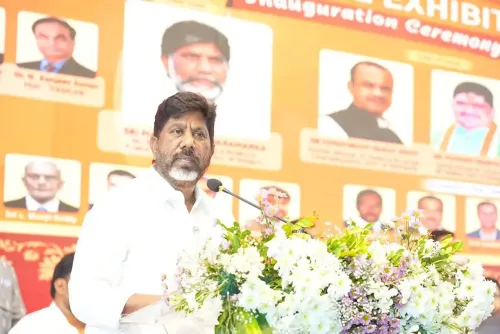What Does Sujata's Surrender Mean for the Anti-LWE Campaign in T'gana?

Synopsis
Key Takeaways
- Sujata's surrender is a significant blow to the Maoist movement.
- Her exit may inspire other Maoists to consider surrender.
- The government aims to restore peace in tribal regions.
- Health issues and disillusionment influenced her decision.
- She will benefit from a rehabilitation program.
Raipur/Hyderabad, Sep 13 (NationPress) In a significant development in India’s battle against left-wing extremism (LWE), senior Maoist leader Pothula Padmawati, also known as Sujata, voluntarily surrendered to the Telangana Police on Saturday.
A member of the Central Committee of the banned CPI (Maoist), Sujata has been a prominent figure for decades across Telangana, Chhattisgarh, and Maharashtra, with a reward of Rs 1 crore placed on her head.
Her surrender is viewed as a major setback for the Maoist movement and indicative of a decline in morale within their ranks, according to the Telangana Police.
At 62 years old, Sujata is originally from Peninskal Padu village in Katu Mandal, Gadwal district. She was born into an agricultural family; her father, Thimarati, served as the village postmaster, while her mother, Wanka, was a homemaker.
She was married to Koteshwar Rao, alias Kishanji, a notable Maoist leader and former secretary of the West Bengal State Committee, who was killed in an encounter in 2011.
The couple has one daughter.
Motivated by early leftist leaders like Patel Sudhakar (Suryam), RK (Sudhakar), and Sugna, Sujata aligned herself with the CPI-ML People’s War Group in 1982.
Throughout her career, she ascended through various roles, including village campaigner, commander of several Talams, and eventually leading the South Bastar Division.
In 2023, she became a member of the Maoist Central Committee and served as editor for Puri, a magazine in the Koya language, as stated by DGP Telangana, Dr. Jitender, during a press briefing.
Highlighting her health concerns and ideological disillusionment, the police chief noted that Sujata expressed her wish to live peacefully with her family and reintegrate into society.
Telangana Police confirmed that she would receive Rs 25 lakh under the state’s comprehensive rehabilitation program, along with additional benefits for surrendered members.
This decision comes on the heels of a series of high-profile eliminations of senior Maoist leaders, including Baswaraju and Balakrishna, who were killed in Chhattisgarh.
These developments, coupled with Union Home Minister Amit Shah’s commitment to eradicate LWE by March 2026, have increased pressure on the organization.
The BJP Chhattisgarh unit announced via X, “Maoist commander and Central Committee member Sujata, who was active in Chhattisgarh and Telangana for decades and had a bounty of Rs 1 crore on her head, has disillusioned with the Maoist ideology and surrendered in Telangana.”
In 2025 alone, 44 underground members from Telangana and Chhattisgarh have surrendered, including several senior leaders.
Officials believe Sujata's departure will destabilize Maoist command structures and encourage others to follow suit, further advancing the government's efforts for peace and stability in long-affected tribal regions.










